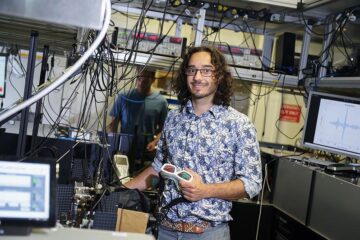Nat. Instrument honours fast electronic feedback circuits developed by the Quantum Dynamics Division

The team was recognized for an outstanding solution to a challenging scientific problem, described in its „FPGA-based Feedback Control of a Single Atom Trajectory“ paper, using both programmable chips from Xilinx and the graphical design language developed by National Instruments. At the award ceremony on August 2, 2011, the awards were presented to Christian Sames, a doctoral student responsible for the technical realization of this project, on behalf of the design team members.
Christian Sames, received his Diploma in Physics at the Technische Universität München in 2008. His diploma thesis work was carried out at the University of Toronto (Canada). Before then he had studied physics at the École Polytechnique Fédérale de Lausanne (EPFL) (Switzerland) for one year. Since the summer of 2008 Christian Sames is doctoral student in the Quantum Dynamics Division of Professor Rempe, participating in the International PhD Programme of Excellence on Quantum Computing, Control and Communication (QCCC), which is part of the Elitenetzwerk Bayern. There he works on the controlled interaction of single atoms, trapped inside a high-quality optical resonator, with single photons.
In order to study fundamental quantum properties of the light-matter interaction, the atom is required to be localized in the centre of this resonator. Inherent heating processes, however, tend to drive the atom away to different positions. This motion has to be suppressed with fast electronic feedback techniques, which have to be evaluated on time scales on the order of a hundred nanoseconds.
The newly developed feedback electronic is based on FPGAs (Field Programmable Gate Arrays) from Xilinx. These integrated circuits are designed to be configured by the customer after manufacturing. Christian Sames employed the graphical design language “LabView FPGA” from National Instruments to achieve this task. Using this new system the performance of the feedback scheme was significantly improved compared to traditional systems.
Christian Sames is delighted that his work and the work of the team received these recognitions. Funny enough, the sheer size of the trophies exceeded the baggage limit on the return flight. Olivia Meyer-Streng
Contact:
Prof. Dr. Gerhard Rempe
Max Planck Institute of Quantum Optics
Phone: +49 – 89 / 32905 701
Fax: +49 – 89 / 32905 311
E-mail: gerhard.rempe@mpq.mpg.de
Christian Sames
Max Planck Institute of Quantum Optics
Phone: +49 – 89 / 32905 785
Fax: +49 – 89 / 32905 395
E-mail: christian.sames@mpq.mpg.de
Dr. Olivia Meyer-Streng
Press and Public Relations
Max Planck Institute of Quantum Optics
Phone: +49 (0) 89 / 32905 – 213
E-mail: olivia.meyer-streng@mpq.mpg.de
Media Contact
Weitere Informationen:
http://www.mpq.mpg.deAlle Nachrichten aus der Kategorie: Förderungen Preise
Neueste Beiträge

Neue universelle lichtbasierte Technik zur Kontrolle der Talpolarisation
Ein internationales Forscherteam berichtet in Nature über eine neue Methode, mit der zum ersten Mal die Talpolarisation in zentrosymmetrischen Bulk-Materialien auf eine nicht materialspezifische Weise erreicht wird. Diese „universelle Technik“…

Tumorzellen hebeln das Immunsystem früh aus
Neu entdeckter Mechanismus könnte Krebs-Immuntherapien deutlich verbessern. Tumore verhindern aktiv, dass sich Immunantworten durch sogenannte zytotoxische T-Zellen bilden, die den Krebs bekämpfen könnten. Wie das genau geschieht, beschreiben jetzt erstmals…

Immunzellen in den Startlöchern: „Allzeit bereit“ ist harte Arbeit
Wenn Krankheitserreger in den Körper eindringen, muss das Immunsystem sofort reagieren und eine Infektion verhindern oder eindämmen. Doch wie halten sich unsere Abwehrzellen bereit, wenn kein Angreifer in Sicht ist?…





















